Hello,
I don’t think that you need to rush to the vets office but I do think it should be seen by them. It is utterly impossible to diagnose any limp or bump via a photo. And honestly even in person I usually have to say that the only way we know for sure what it is is with biopsy. It is small so your vet might also ok the watch and wait scenario. But if I do this with my clients I always preface it with the following:
I measure the mass with a ruler. And I tell the client to measure it at least weekly so monitor growth. I also give a “return for recheck” instruction if it grows by 20% or more. And I further go on to say “remove if it gets ____ big”. So it doesn’t grow too big to allow surgical excision.
I hope this helps. Let us know what happens. Also ask your vet if they think it might be a histiocytoma. I’ve seen lots of them. Good luck.
Lucy is a rescue, she is female Chihuahua Mix. We notices she has not been bearing weight on the back leg. More like she was limping, bearing weight more days than other. I was thinking old age, sore muscle. We watch her closely, it seem to be getting better. Then last night on her walked something spooked her and she darted for the house. Since then she does not even extend that leg, she hobbles and wobbles on the three. I am waiting for the vet to call back for an appointment. What should I expect has for as cost for x-rays, I only ask because I assume this will be needed and when I ask an approximate cost, I was told that information is not available to give. What is the best case scenario for Lucy given her age, What is the wort I can expect? I check her leg for mobility and she is moving in all directions and does not appear to bother her. ( the leg in question) Thank you for your time and consideration in this.
Comments
Small lump on dogs ear.
My dog is around 10 years old at this point, he is a King Charles spaniel x Patterdale and has never had any major health problems. He is an extremely active and energetic dog but has a small hard red lump on his ear.
I probably noticed it a few weeks ago, as far as I can tell it hasn’t changed in size. He quite often gets thorns stuck in his skin as he likes to dive into absolutely anything to retrieve his ball, so maybe it could be an infected thorn wound? Even so, I will most likely be taking him to the vet but would like some other opinions first.
(It doesn’t seem to be giving him any discomfort)
Comments
I have a small pug that has enlarged testicles that is dragging on the ground and seems to be a little reddish from scraping the ground. Is it possible to have his testicles removed and how much can I expect to pay. He’s 13 years old.
Comments
My puppy has a lump on the right side of her face. My dog sitter pointed it out to me when I picked her up from daycare today. It is soft and tender to the touch. She does not like when I try and touch it and I am unable to look inside of her mouth. It seems like it is really bothering her. She is eating and drinking normally this evening, but created herself and seems like she is in pain. I made her a vet appointment for tomorrow afternoon but is this something I should be seeking more immediate attention for?
Comments
Hi Pawbly friends- my neighbor 2 houses down has chickens- they are free range, so they frequent our yard. I honestly do not mind; we live in the country and I’m not worried if my lawn looks like a golf course or my garden is picked through. A few months ago, one of our shepherds got one of the chickens as it was running from our yard, I assume back to it’s yard. Sadly, she got it right next door at the house between us. Since then I have tried to be diligent about when I let the dogs out to check and see if the chickens are out and where they are. On Saturday my son had the dogs with him in the driveway and didn’t notice the chickens down below and one of the dogs got one by our garage at the bottom of our driveway. He did not tell me this by the way until this past Thursday. He told me Thursday because yet again, he was in the driveway with the dogs and one of them saw a chicken in our front yard and gave chase- ended up killing it in the house between’s yard again. I of course went to the neighbor down the street right away and told her what happened. She is very angry and upset, understandably. I asked if there was anything that I could do- but honestly she wanted nothing to do with me, so I let myself out. I’m devastated and have told the kids they cannot be outside with the dogs anymore unless I am with them or the chickens are not out. I got some gift cards to shoprite and wrote another apology and left it on her door as she didn’t answer. We are looking into a fence of about 900 feet if we can afford it, to put up just between our acreage and our immediate neighbor’s yard in an effort to keep the chicken out and the dogs temptation at bay. My fear is that I won’t be able to let my dogs outside now that they have found out about chasing chickens. Any advice would be greatly appreciated.
Comments
Five days ago my 7year old German Shepherd was out side playing and running with my beagle puppy. Next thing I know she is yelping in pain and rolling around on the ground. By the time I get to her she has stopped crying out and is laying still. I realize both hind legs are paralyzed. We immediately take her to the vet and she is examined. She doesn’t appear to be in any pain and she DOES have deep pain sensation! She is immediately started on Steroids, Muscle Relaxers, and Anti Inflammatories. She remains at the vets for five days and receives cold laser therapy and a small amount of PT. She never looses her DPS and really seems to be in good spirits. I took her home yesterday and I am determined to help her regain her mobility. I do not have a true diagnosis and seeing a Neurologist is not going to happen due to finances and living so far from one. My vet told me to take her home and gave me range of motion exercises and told me to buy her a harness. He said it will just take time. She is able to relieve herself without help! She is reacting more each day to us touching her legs and back!!
I am so confused and have read everything I can find on the subject and can’t get any answers. Should I start working with her and letting her walk or should I confine her to her kennel for a while? Should I use a harness or not? I just wish I had some answers!! Please help!!
Comments
My vet strongly suspects my cat has a nasal polyp. She has be snoring/snarling consistently for 2.5 years, but is otherwise fine. When it began, I first had a potential infection treated with two antibiotics, followed by a teeth cleaning, that yielded no issues with the teeth, and ended with a nasal flush. My vet was hoping to be able to see and grab the polyp during the flush, but couldn’t. Because she was otherwise healthy, eating, and playing, I went without treating it. Recently, she was treated for a G.I. flair up that had her not eating. She had begun not eating or moving get bowels for days. Once vomiting was added in, I took her to Metropolitan Emergency Vet. They gave her an ultrasound, saw the inflammation and gas in her abdomen, took a CBC, gave her fluids and nausea medication and sent her home a couple hours later for $800. Her bloodwork was was fine, aside from dehydration. She continued not to eat, so I brought her to my vet a day and a half later. They did an x-ray and saw the lower intestine looked aggravated. They kept her for the weekend and gave her fluids and more nausea medication. She returned to me after two days and began eating again at home. I’m awaiting the additional $600 bill for that. While being discharged, one of the docs urged me to address what she felt strongly was likely a polyp in her nasal cavity, as she believed it may now be large enough that it’s limiting her ability to smell, which may have contributed to the refusal to eat with the G.I. issue coexisting for a few days. She referred me to the specialty docs locally to have the nasal polyp removed. They are quoting me $3,195 plus. They said it would be $195 for a internal med consult, $1,500 for a “necessary” CT, and $1,500 or more for the Rhinoscopy. My vet said Lilah is otherwise a healthy 12 year old cat. I am sick with the cost, as I will need to put it all on a credit card. I have called around to multiple other specialty vets and I’m getting comparable quotes. I have had family members suggest I euthanize my cat over a nasal polyp, which I absolutely will not do. I stumbled across a Utube video of you removing a nasal polyp, so I tracked you down by name, wondering if you could help Lilah? I’m two hours from your practice, which is close enough. I’d really appreciate you getting back to me. As of now, we have a consult scheduled for 3/4, and I’m sick over the cost.
Thank you,
Diana Maginn






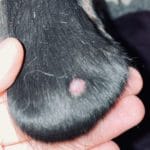










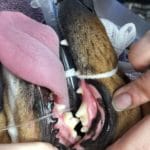
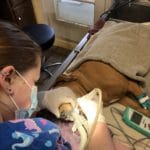
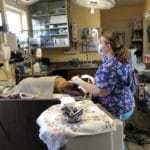
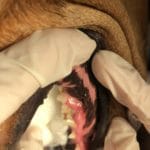
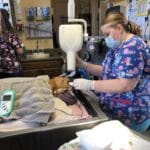
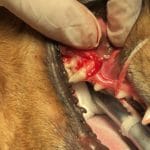

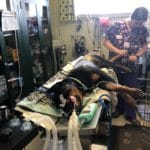


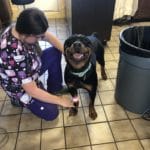
Good morning- so sorry Lucy is in pain. It think that when you get into the vet, you should discuss cost up front. They should most definitely be able to give you an approximate cost of at least the exam and an X-ray. If not, ask them why. At my vet, the pricing is listed upfront- it is $100 for 1 image, $150 for 2 – 3 images… Just be honest and let them know you need to know how much to set aside to be able to pay them. Depending on her exam, and how long ago her last check up was, they may also want to do blood work. Hopefully after an X-ray and exam, you will have a better idea of what you are dealing with. Very best of luck. Please keep us posted on Lucy.